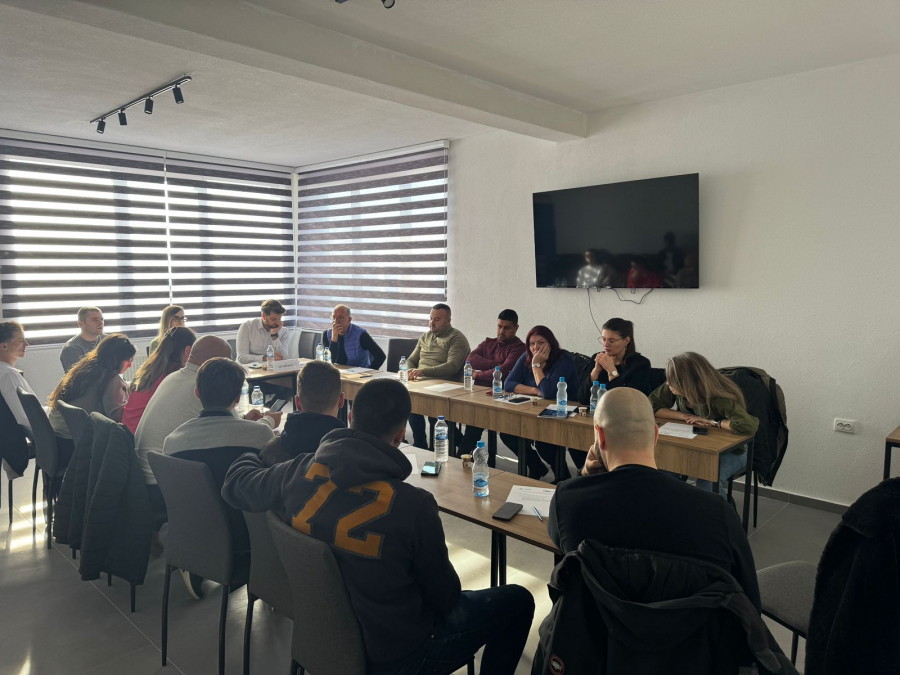18/12/2024

On December 18th, the Kosovar Center for Security Studies held a roundtable discussion in the municipality of Gracanica. This is the second roundtable that is taking place in an ethnically diverse municipality, as part of the project supported by National Endowment for Democracy titled “Promoting Government Transparency and Accountability in Interethnic Dialogue.” The main focus of the roundtable was to address challenges that people in Gracanica might be facing, both in the economical, educational and interethnic sectors. The event saw the presence of both local municipal workers and young people, showcasing different perspectives and recommendations regarding a better future for Gracanica. The event was opened by Jeta Loshaj, researcher at KCSS, followed by welcoming remarks by Leutrim Aliu, Deputy Mayor of the Municipality of Gracanica and Petar Djordjevic, member of Active Youth Gracanica.
KCSS shared their experience with Kamenica, where good inter-ethnic relations seem to be a staple of everyday life. Participants in Gracanica echoed the sentiment, one even stating that inter-ethnic coexistence is an inseparable part of Gracanica.
Shared Challenges of the Municipality
When asked about challenges within the municipality, participants mentioned the lack of job opportunities, citing the private sector as one of the most underdeveloped ones. The municipality of Gracanica offers grants for startups and businesses that need further development. However, as one participant and municipal worker mentioned, people just apply for the grants and rarely do the work that is required afterwards. The private sector is deeply underdeveloped, whereas the public sector does not have the capacity to employ everyone. A participant, who also works as a beekeeper, mentioned the lack of interest from people to work in fields that are not medicine or education.
Different bureaucracies are also very challenging. The nostrification of diplomas was taken as an example, where most participants agreed that language barriers have their part to play in making the process so difficult.
The Role of Disinformation
Disinformation, according to the participants, is rather present within the community. A participant mentioned elderly people reading things on the internet and believing it to be true. Moreover, the internet being used with malicious intent is not uncommon. Participants talked about the main mediums that the people of Gracanica use to get informed, ranging from local media to outlets like Kosovo Online, RTS, Dnevnik and many more. It is worth mentioning that Serbian mediums do take Albanian mediums as sources for their news and vice versa.
Dealing with the past
The legacy of the war, dealing with the past and how that is discussed was seen as something that is utilized by the “political moment,” as one participant said. It is something that still follows the youth to this day, despite the long years that have passed. Agnesa, a participant and student of sociology, stated that sometimes it is people that have never gone through the war that tend to be more nationalistic. It is seen as a resonation with their history rather than experience. She took an example from her hometown of Prizren, a city known for its multi-ethnic community.
The Outlook Towards the Future
In conclusion, most recommendations called for both local and international partners to push for opening factories, citing the need for communication between communities. These new job opportunities would give people the chance to travel and meet one another. One participant shared the story of his Albanian friend who went to specialize for a license in Belgrade. While reasonable wary at first, he then stated that Belgrade and the people there were actually very positive. The discussion ended on a positive note, with a commitment to fostering further positive interaction and cooperation between communities.
This community roundtable was the second out of six roundtables planned to take place across different municipalities in Kosovo, which are part of the project supported by National Endowment for Democracy (NED). This project will be implemented throughout 2024/2025 and aims to provide an insightful and comprehensive overview of the state of interethnic relations in Kosovo with the ultimate objective of suggesting the way forward for a sustainable, inclusive, and open dialogue between interethnic communities, government institutions, and the civil society in Kosovo.